Impact of Globalization on Multinational Companies: Marks and Spencer
VerifiedAdded on 2020/10/22
|15
|5386
|191
Report
AI Summary
This research project investigates the multifaceted impact of globalization on multinational companies, using Marks and Spencer (M&S) as a central case study. The report begins by establishing the research background, aims, objectives, research questions, and rationale for the study, emphasizing globalization's influence on business operations, resource transfer, and market dynamics. The literature review explores the trends of globalization on multinational companies, evaluating the impacts of globalization on companies like M&S and examining challenges they face due to international business. The research methodology provides the framework for the study. The report then analyzes the challenges faced by M&S, including increased competition, technological advancements, cultural adaptations, and environmental concerns. The conclusion summarizes the findings and offers recommendations for companies to navigate these challenges effectively, followed by a comprehensive list of references.
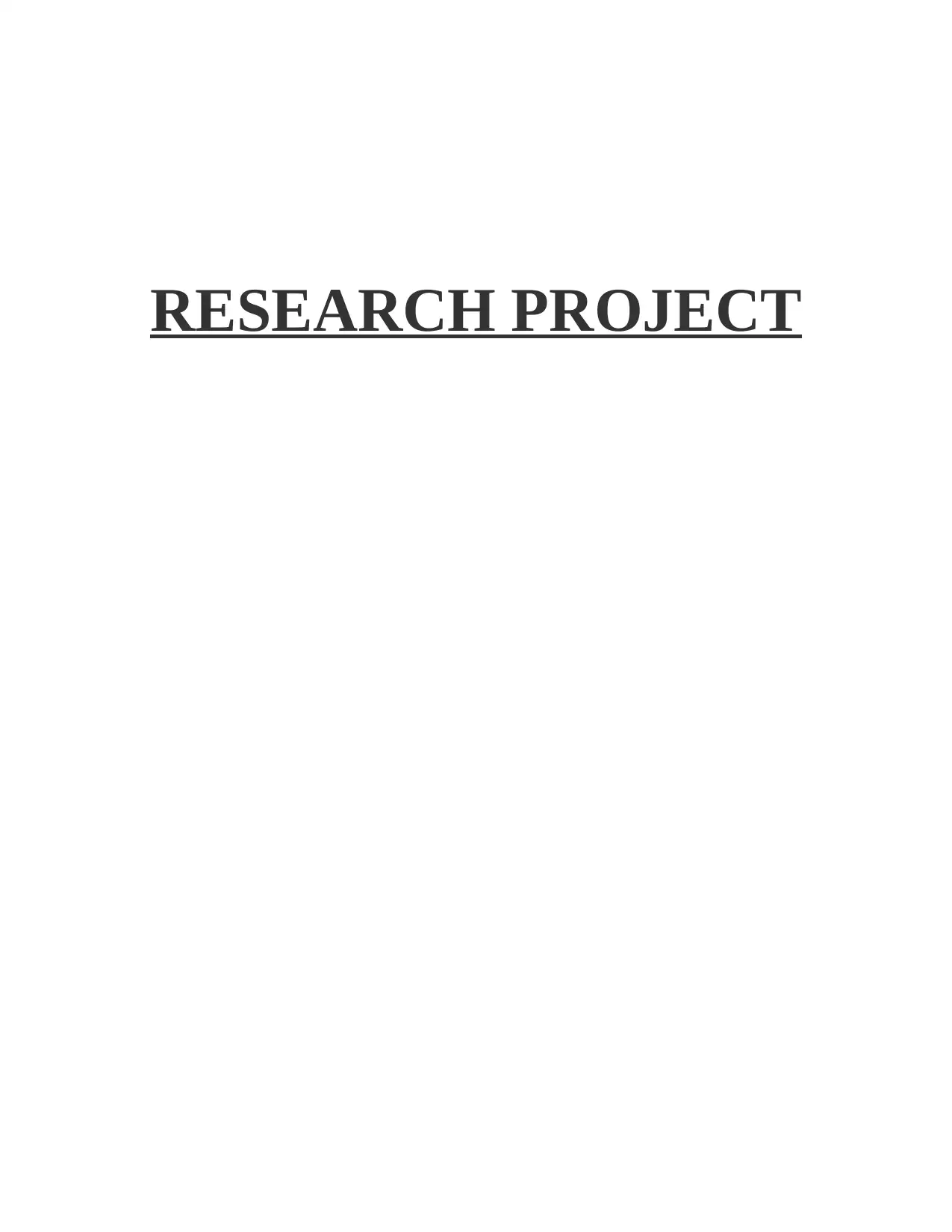
RESEARCH PROJECT
Paraphrase This Document
Need a fresh take? Get an instant paraphrase of this document with our AI Paraphraser
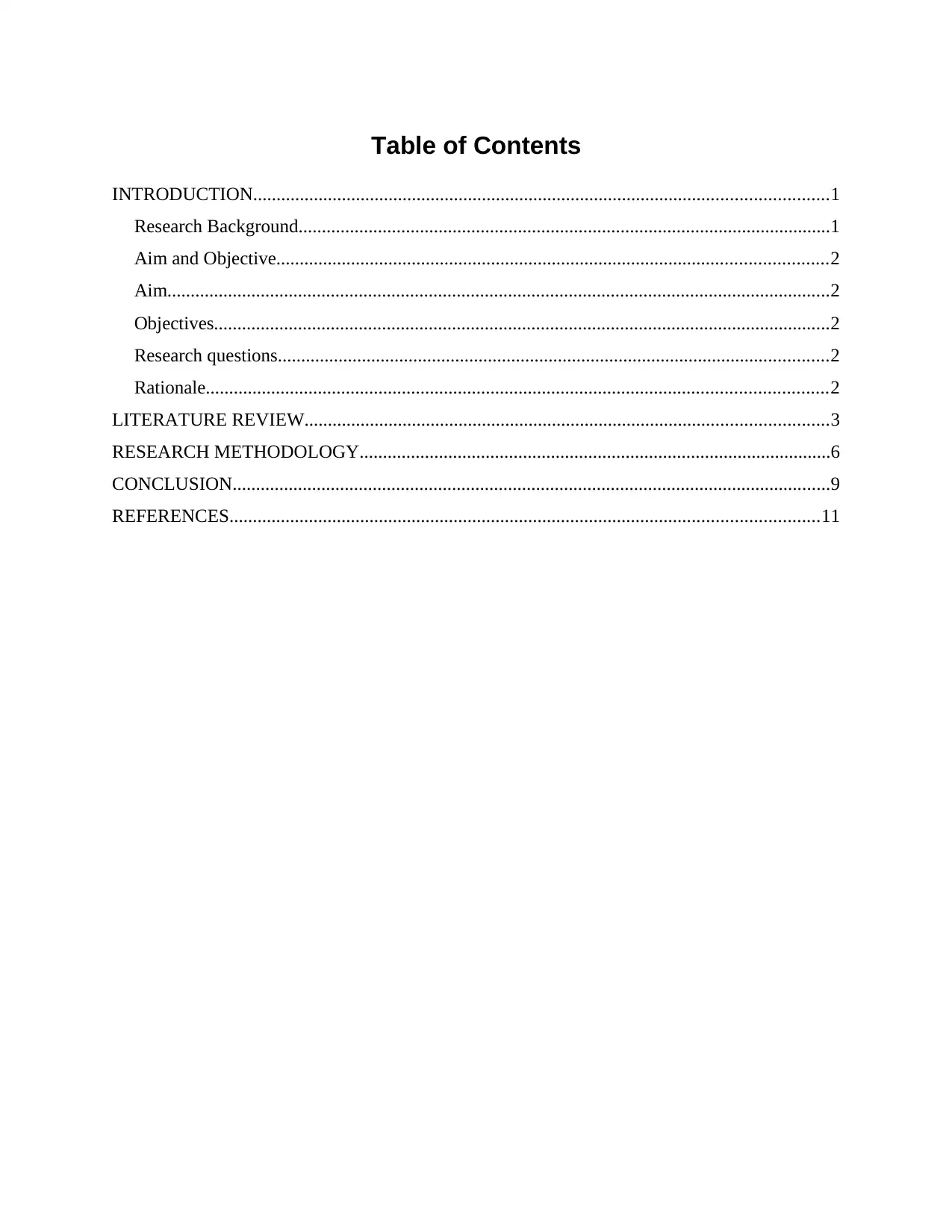
Table of Contents
INTRODUCTION...........................................................................................................................1
Research Background..................................................................................................................1
Aim and Objective......................................................................................................................2
Aim..............................................................................................................................................2
Objectives....................................................................................................................................2
Research questions......................................................................................................................2
Rationale.....................................................................................................................................2
LITERATURE REVIEW................................................................................................................3
RESEARCH METHODOLOGY.....................................................................................................6
CONCLUSION................................................................................................................................9
REFERENCES..............................................................................................................................11
INTRODUCTION...........................................................................................................................1
Research Background..................................................................................................................1
Aim and Objective......................................................................................................................2
Aim..............................................................................................................................................2
Objectives....................................................................................................................................2
Research questions......................................................................................................................2
Rationale.....................................................................................................................................2
LITERATURE REVIEW................................................................................................................3
RESEARCH METHODOLOGY.....................................................................................................6
CONCLUSION................................................................................................................................9
REFERENCES..............................................................................................................................11
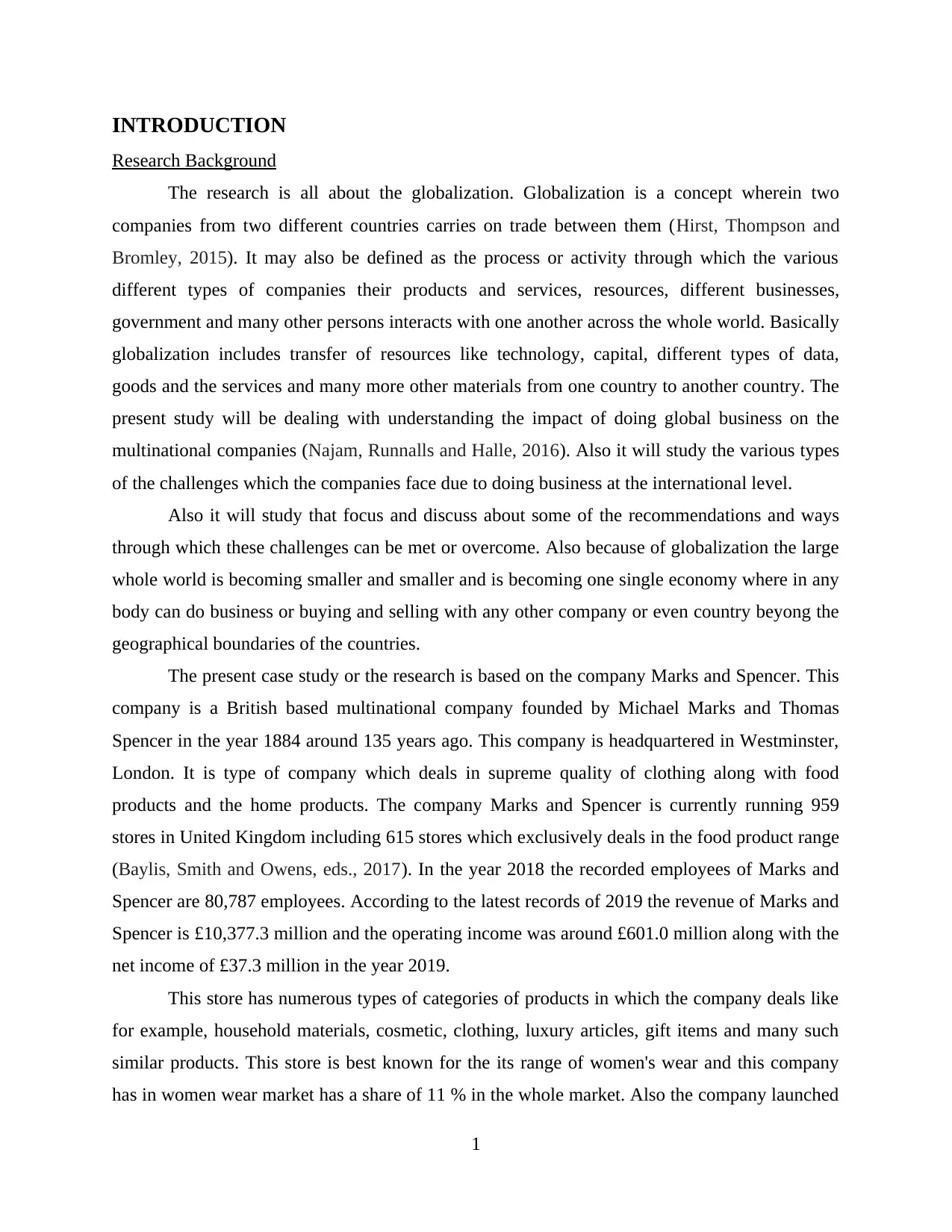
INTRODUCTION
Research Background
The research is all about the globalization. Globalization is a concept wherein two
companies from two different countries carries on trade between them (Hirst, Thompson and
Bromley, 2015). It may also be defined as the process or activity through which the various
different types of companies their products and services, resources, different businesses,
government and many other persons interacts with one another across the whole world. Basically
globalization includes transfer of resources like technology, capital, different types of data,
goods and the services and many more other materials from one country to another country. The
present study will be dealing with understanding the impact of doing global business on the
multinational companies (Najam, Runnalls and Halle, 2016). Also it will study the various types
of the challenges which the companies face due to doing business at the international level.
Also it will study that focus and discuss about some of the recommendations and ways
through which these challenges can be met or overcome. Also because of globalization the large
whole world is becoming smaller and smaller and is becoming one single economy where in any
body can do business or buying and selling with any other company or even country beyong the
geographical boundaries of the countries.
The present case study or the research is based on the company Marks and Spencer. This
company is a British based multinational company founded by Michael Marks and Thomas
Spencer in the year 1884 around 135 years ago. This company is headquartered in Westminster,
London. It is type of company which deals in supreme quality of clothing along with food
products and the home products. The company Marks and Spencer is currently running 959
stores in United Kingdom including 615 stores which exclusively deals in the food product range
(Baylis, Smith and Owens, eds., 2017). In the year 2018 the recorded employees of Marks and
Spencer are 80,787 employees. According to the latest records of 2019 the revenue of Marks and
Spencer is £10,377.3 million and the operating income was around £601.0 million along with the
net income of £37.3 million in the year 2019.
This store has numerous types of categories of products in which the company deals like
for example, household materials, cosmetic, clothing, luxury articles, gift items and many such
similar products. This store is best known for the its range of women's wear and this company
has in women wear market has a share of 11 % in the whole market. Also the company launched
1
Research Background
The research is all about the globalization. Globalization is a concept wherein two
companies from two different countries carries on trade between them (Hirst, Thompson and
Bromley, 2015). It may also be defined as the process or activity through which the various
different types of companies their products and services, resources, different businesses,
government and many other persons interacts with one another across the whole world. Basically
globalization includes transfer of resources like technology, capital, different types of data,
goods and the services and many more other materials from one country to another country. The
present study will be dealing with understanding the impact of doing global business on the
multinational companies (Najam, Runnalls and Halle, 2016). Also it will study the various types
of the challenges which the companies face due to doing business at the international level.
Also it will study that focus and discuss about some of the recommendations and ways
through which these challenges can be met or overcome. Also because of globalization the large
whole world is becoming smaller and smaller and is becoming one single economy where in any
body can do business or buying and selling with any other company or even country beyong the
geographical boundaries of the countries.
The present case study or the research is based on the company Marks and Spencer. This
company is a British based multinational company founded by Michael Marks and Thomas
Spencer in the year 1884 around 135 years ago. This company is headquartered in Westminster,
London. It is type of company which deals in supreme quality of clothing along with food
products and the home products. The company Marks and Spencer is currently running 959
stores in United Kingdom including 615 stores which exclusively deals in the food product range
(Baylis, Smith and Owens, eds., 2017). In the year 2018 the recorded employees of Marks and
Spencer are 80,787 employees. According to the latest records of 2019 the revenue of Marks and
Spencer is £10,377.3 million and the operating income was around £601.0 million along with the
net income of £37.3 million in the year 2019.
This store has numerous types of categories of products in which the company deals like
for example, household materials, cosmetic, clothing, luxury articles, gift items and many such
similar products. This store is best known for the its range of women's wear and this company
has in women wear market has a share of 11 % in the whole market. Also the company launched
1
⊘ This is a preview!⊘
Do you want full access?
Subscribe today to unlock all pages.

Trusted by 1+ million students worldwide
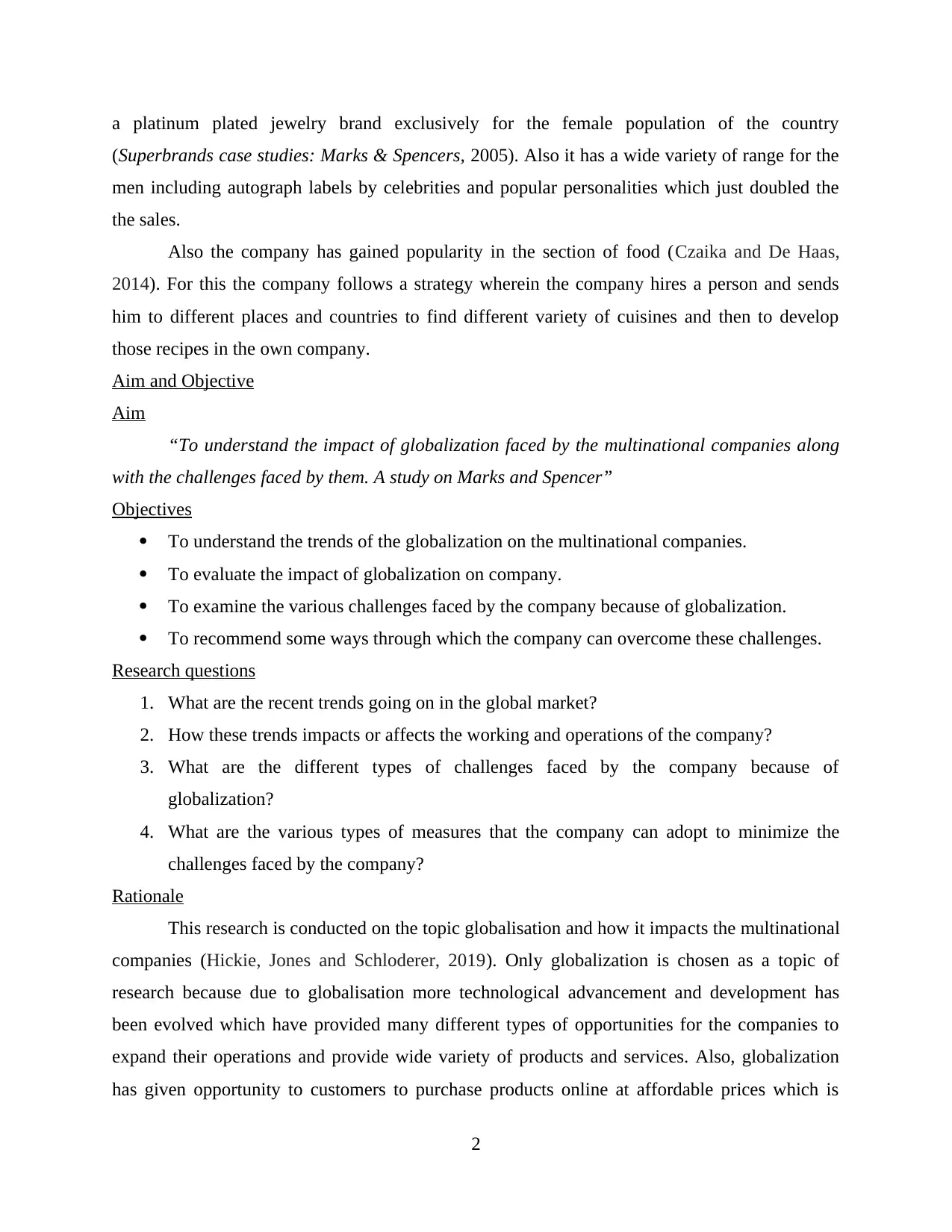
a platinum plated jewelry brand exclusively for the female population of the country
(Superbrands case studies: Marks & Spencers, 2005). Also it has a wide variety of range for the
men including autograph labels by celebrities and popular personalities which just doubled the
the sales.
Also the company has gained popularity in the section of food (Czaika and De Haas,
2014). For this the company follows a strategy wherein the company hires a person and sends
him to different places and countries to find different variety of cuisines and then to develop
those recipes in the own company.
Aim and Objective
Aim
“To understand the impact of globalization faced by the multinational companies along
with the challenges faced by them. A study on Marks and Spencer”
Objectives
To understand the trends of the globalization on the multinational companies.
To evaluate the impact of globalization on company.
To examine the various challenges faced by the company because of globalization.
To recommend some ways through which the company can overcome these challenges.
Research questions
1. What are the recent trends going on in the global market?
2. How these trends impacts or affects the working and operations of the company?
3. What are the different types of challenges faced by the company because of
globalization?
4. What are the various types of measures that the company can adopt to minimize the
challenges faced by the company?
Rationale
This research is conducted on the topic globalisation and how it impacts the multinational
companies (Hickie, Jones and Schloderer, 2019). Only globalization is chosen as a topic of
research because due to globalisation more technological advancement and development has
been evolved which have provided many different types of opportunities for the companies to
expand their operations and provide wide variety of products and services. Also, globalization
has given opportunity to customers to purchase products online at affordable prices which is
2
(Superbrands case studies: Marks & Spencers, 2005). Also it has a wide variety of range for the
men including autograph labels by celebrities and popular personalities which just doubled the
the sales.
Also the company has gained popularity in the section of food (Czaika and De Haas,
2014). For this the company follows a strategy wherein the company hires a person and sends
him to different places and countries to find different variety of cuisines and then to develop
those recipes in the own company.
Aim and Objective
Aim
“To understand the impact of globalization faced by the multinational companies along
with the challenges faced by them. A study on Marks and Spencer”
Objectives
To understand the trends of the globalization on the multinational companies.
To evaluate the impact of globalization on company.
To examine the various challenges faced by the company because of globalization.
To recommend some ways through which the company can overcome these challenges.
Research questions
1. What are the recent trends going on in the global market?
2. How these trends impacts or affects the working and operations of the company?
3. What are the different types of challenges faced by the company because of
globalization?
4. What are the various types of measures that the company can adopt to minimize the
challenges faced by the company?
Rationale
This research is conducted on the topic globalisation and how it impacts the multinational
companies (Hickie, Jones and Schloderer, 2019). Only globalization is chosen as a topic of
research because due to globalisation more technological advancement and development has
been evolved which have provided many different types of opportunities for the companies to
expand their operations and provide wide variety of products and services. Also, globalization
has given opportunity to customers to purchase products online at affordable prices which is
2
Paraphrase This Document
Need a fresh take? Get an instant paraphrase of this document with our AI Paraphraser
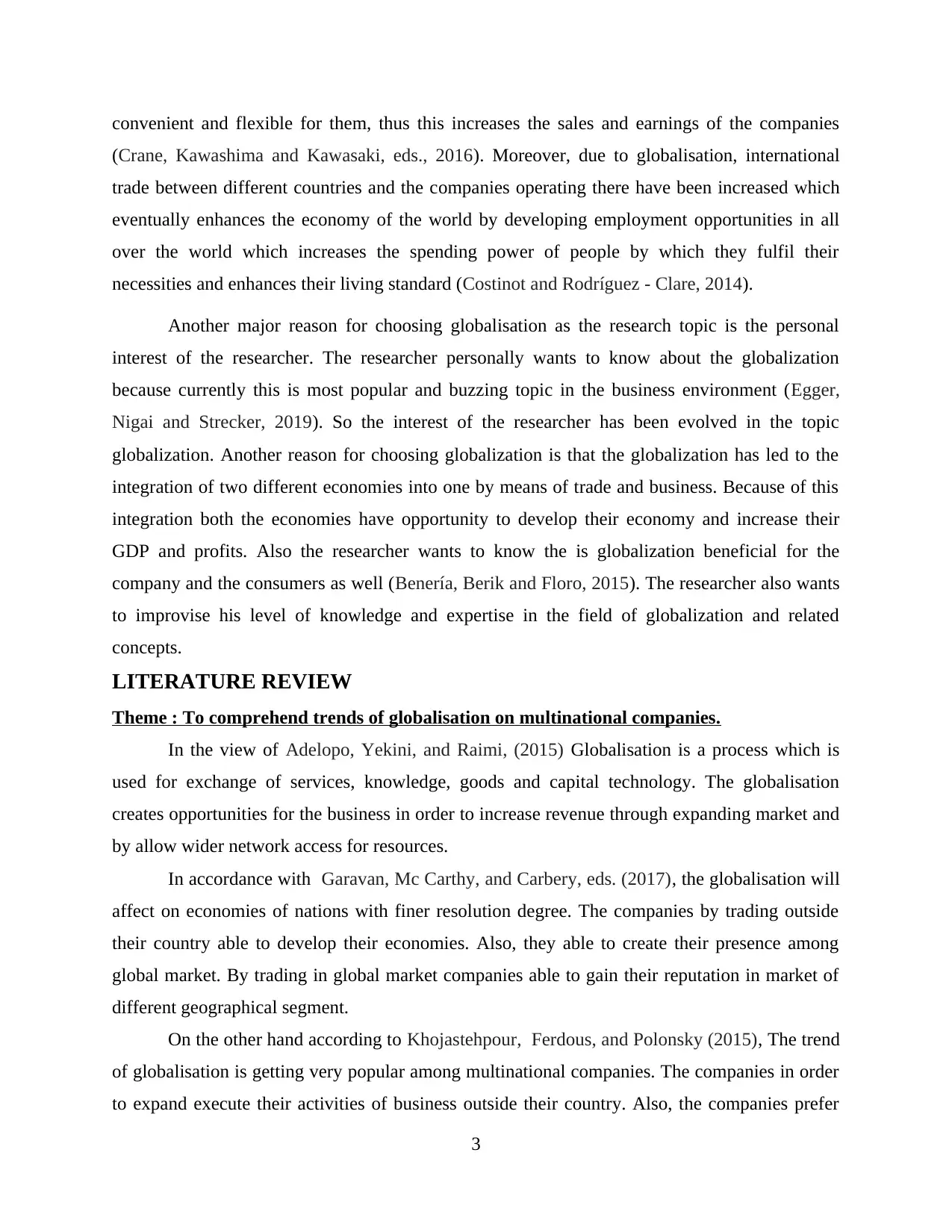
convenient and flexible for them, thus this increases the sales and earnings of the companies
(Crane, Kawashima and Kawasaki, eds., 2016). Moreover, due to globalisation, international
trade between different countries and the companies operating there have been increased which
eventually enhances the economy of the world by developing employment opportunities in all
over the world which increases the spending power of people by which they fulfil their
necessities and enhances their living standard (Costinot and Rodríguez - Clare, 2014).
Another major reason for choosing globalisation as the research topic is the personal
interest of the researcher. The researcher personally wants to know about the globalization
because currently this is most popular and buzzing topic in the business environment (Egger,
Nigai and Strecker, 2019). So the interest of the researcher has been evolved in the topic
globalization. Another reason for choosing globalization is that the globalization has led to the
integration of two different economies into one by means of trade and business. Because of this
integration both the economies have opportunity to develop their economy and increase their
GDP and profits. Also the researcher wants to know the is globalization beneficial for the
company and the consumers as well (Benería, Berik and Floro, 2015). The researcher also wants
to improvise his level of knowledge and expertise in the field of globalization and related
concepts.
LITERATURE REVIEW
Theme : To comprehend trends of globalisation on multinational companies.
In the view of Adelopo, Yekini, and Raimi, (2015) Globalisation is a process which is
used for exchange of services, knowledge, goods and capital technology. The globalisation
creates opportunities for the business in order to increase revenue through expanding market and
by allow wider network access for resources.
In accordance with Garavan, Mc Carthy, and Carbery, eds. (2017), the globalisation will
affect on economies of nations with finer resolution degree. The companies by trading outside
their country able to develop their economies. Also, they able to create their presence among
global market. By trading in global market companies able to gain their reputation in market of
different geographical segment.
On the other hand according to Khojastehpour, Ferdous, and Polonsky (2015), The trend
of globalisation is getting very popular among multinational companies. The companies in order
to expand execute their activities of business outside their country. Also, the companies prefer
3
(Crane, Kawashima and Kawasaki, eds., 2016). Moreover, due to globalisation, international
trade between different countries and the companies operating there have been increased which
eventually enhances the economy of the world by developing employment opportunities in all
over the world which increases the spending power of people by which they fulfil their
necessities and enhances their living standard (Costinot and Rodríguez - Clare, 2014).
Another major reason for choosing globalisation as the research topic is the personal
interest of the researcher. The researcher personally wants to know about the globalization
because currently this is most popular and buzzing topic in the business environment (Egger,
Nigai and Strecker, 2019). So the interest of the researcher has been evolved in the topic
globalization. Another reason for choosing globalization is that the globalization has led to the
integration of two different economies into one by means of trade and business. Because of this
integration both the economies have opportunity to develop their economy and increase their
GDP and profits. Also the researcher wants to know the is globalization beneficial for the
company and the consumers as well (Benería, Berik and Floro, 2015). The researcher also wants
to improvise his level of knowledge and expertise in the field of globalization and related
concepts.
LITERATURE REVIEW
Theme : To comprehend trends of globalisation on multinational companies.
In the view of Adelopo, Yekini, and Raimi, (2015) Globalisation is a process which is
used for exchange of services, knowledge, goods and capital technology. The globalisation
creates opportunities for the business in order to increase revenue through expanding market and
by allow wider network access for resources.
In accordance with Garavan, Mc Carthy, and Carbery, eds. (2017), the globalisation will
affect on economies of nations with finer resolution degree. The companies by trading outside
their country able to develop their economies. Also, they able to create their presence among
global market. By trading in global market companies able to gain their reputation in market of
different geographical segment.
On the other hand according to Khojastehpour, Ferdous, and Polonsky (2015), The trend
of globalisation is getting very popular among multinational companies. The companies in order
to expand execute their activities of business outside their country. Also, the companies prefer
3
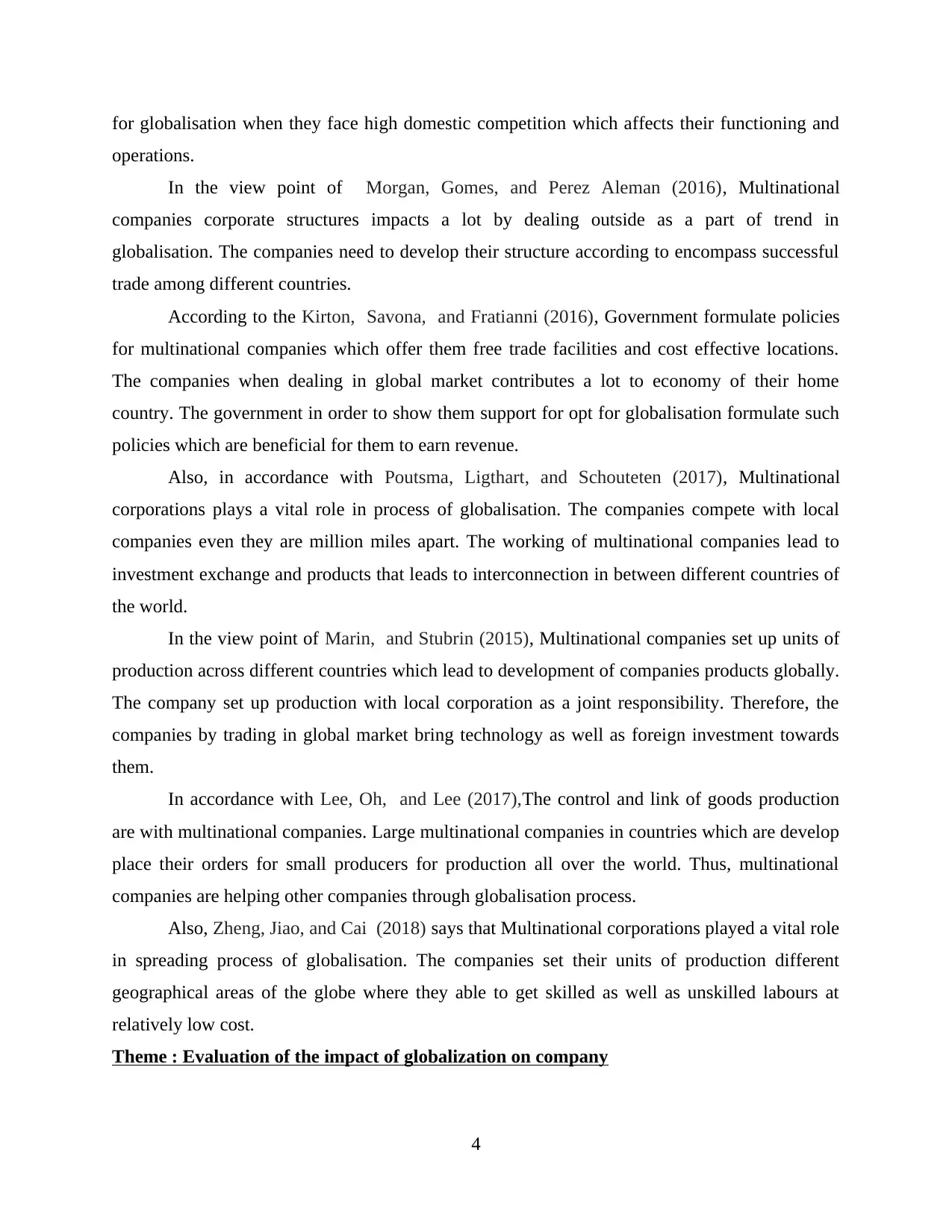
for globalisation when they face high domestic competition which affects their functioning and
operations.
In the view point of Morgan, Gomes, and Perez Aleman (2016), Multinational
companies corporate structures impacts a lot by dealing outside as a part of trend in
globalisation. The companies need to develop their structure according to encompass successful
trade among different countries.
According to the Kirton, Savona, and Fratianni (2016), Government formulate policies
for multinational companies which offer them free trade facilities and cost effective locations.
The companies when dealing in global market contributes a lot to economy of their home
country. The government in order to show them support for opt for globalisation formulate such
policies which are beneficial for them to earn revenue.
Also, in accordance with Poutsma, Ligthart, and Schouteten (2017), Multinational
corporations plays a vital role in process of globalisation. The companies compete with local
companies even they are million miles apart. The working of multinational companies lead to
investment exchange and products that leads to interconnection in between different countries of
the world.
In the view point of Marin, and Stubrin (2015), Multinational companies set up units of
production across different countries which lead to development of companies products globally.
The company set up production with local corporation as a joint responsibility. Therefore, the
companies by trading in global market bring technology as well as foreign investment towards
them.
In accordance with Lee, Oh, and Lee (2017),The control and link of goods production
are with multinational companies. Large multinational companies in countries which are develop
place their orders for small producers for production all over the world. Thus, multinational
companies are helping other companies through globalisation process.
Also, Zheng, Jiao, and Cai (2018) says that Multinational corporations played a vital role
in spreading process of globalisation. The companies set their units of production different
geographical areas of the globe where they able to get skilled as well as unskilled labours at
relatively low cost.
Theme : Evaluation of the impact of globalization on company
4
operations.
In the view point of Morgan, Gomes, and Perez Aleman (2016), Multinational
companies corporate structures impacts a lot by dealing outside as a part of trend in
globalisation. The companies need to develop their structure according to encompass successful
trade among different countries.
According to the Kirton, Savona, and Fratianni (2016), Government formulate policies
for multinational companies which offer them free trade facilities and cost effective locations.
The companies when dealing in global market contributes a lot to economy of their home
country. The government in order to show them support for opt for globalisation formulate such
policies which are beneficial for them to earn revenue.
Also, in accordance with Poutsma, Ligthart, and Schouteten (2017), Multinational
corporations plays a vital role in process of globalisation. The companies compete with local
companies even they are million miles apart. The working of multinational companies lead to
investment exchange and products that leads to interconnection in between different countries of
the world.
In the view point of Marin, and Stubrin (2015), Multinational companies set up units of
production across different countries which lead to development of companies products globally.
The company set up production with local corporation as a joint responsibility. Therefore, the
companies by trading in global market bring technology as well as foreign investment towards
them.
In accordance with Lee, Oh, and Lee (2017),The control and link of goods production
are with multinational companies. Large multinational companies in countries which are develop
place their orders for small producers for production all over the world. Thus, multinational
companies are helping other companies through globalisation process.
Also, Zheng, Jiao, and Cai (2018) says that Multinational corporations played a vital role
in spreading process of globalisation. The companies set their units of production different
geographical areas of the globe where they able to get skilled as well as unskilled labours at
relatively low cost.
Theme : Evaluation of the impact of globalization on company
4
⊘ This is a preview!⊘
Do you want full access?
Subscribe today to unlock all pages.

Trusted by 1+ million students worldwide
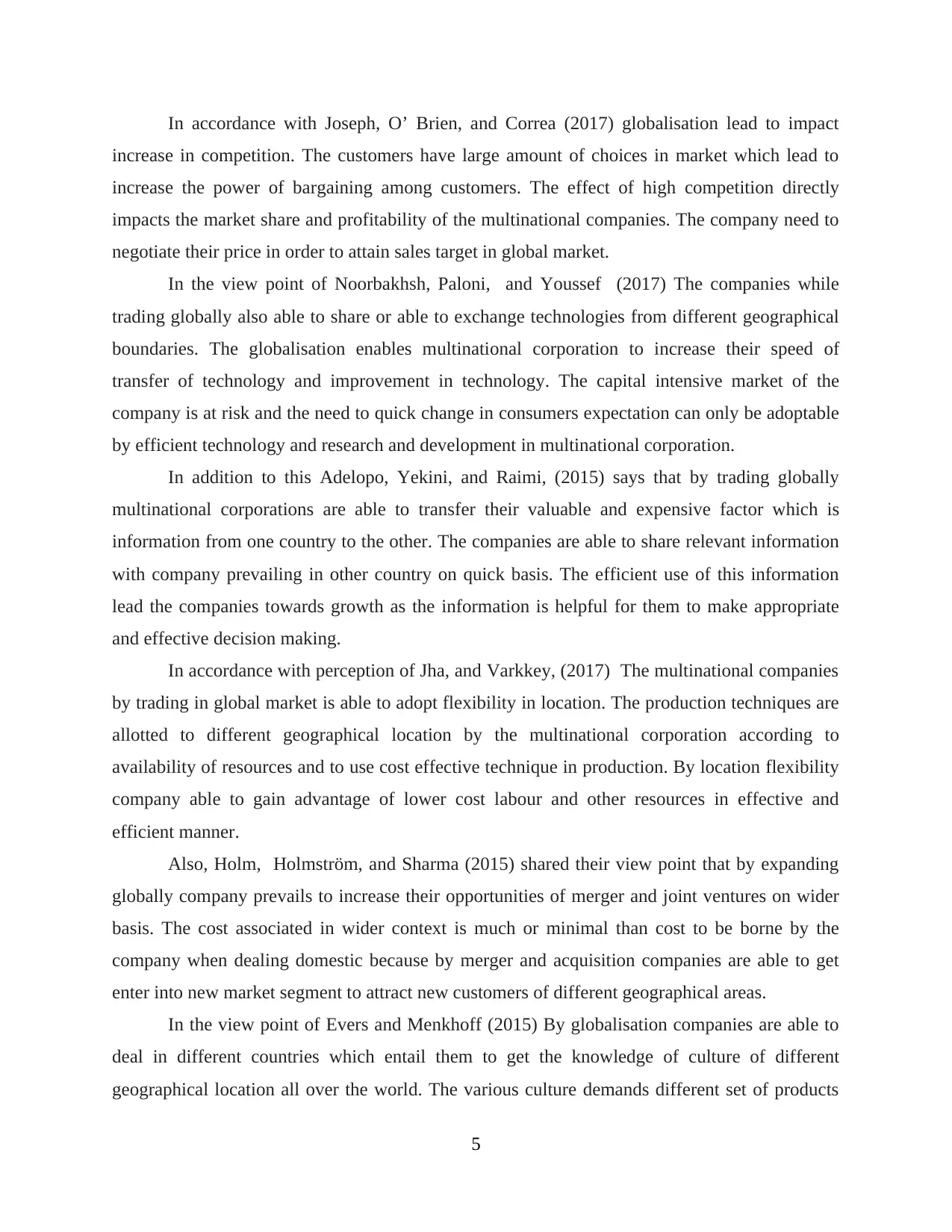
In accordance with Joseph, O’ Brien, and Correa (2017) globalisation lead to impact
increase in competition. The customers have large amount of choices in market which lead to
increase the power of bargaining among customers. The effect of high competition directly
impacts the market share and profitability of the multinational companies. The company need to
negotiate their price in order to attain sales target in global market.
In the view point of Noorbakhsh, Paloni, and Youssef (2017) The companies while
trading globally also able to share or able to exchange technologies from different geographical
boundaries. The globalisation enables multinational corporation to increase their speed of
transfer of technology and improvement in technology. The capital intensive market of the
company is at risk and the need to quick change in consumers expectation can only be adoptable
by efficient technology and research and development in multinational corporation.
In addition to this Adelopo, Yekini, and Raimi, (2015) says that by trading globally
multinational corporations are able to transfer their valuable and expensive factor which is
information from one country to the other. The companies are able to share relevant information
with company prevailing in other country on quick basis. The efficient use of this information
lead the companies towards growth as the information is helpful for them to make appropriate
and effective decision making.
In accordance with perception of Jha, and Varkkey, (2017) The multinational companies
by trading in global market is able to adopt flexibility in location. The production techniques are
allotted to different geographical location by the multinational corporation according to
availability of resources and to use cost effective technique in production. By location flexibility
company able to gain advantage of lower cost labour and other resources in effective and
efficient manner.
Also, Holm, Holmström, and Sharma (2015) shared their view point that by expanding
globally company prevails to increase their opportunities of merger and joint ventures on wider
basis. The cost associated in wider context is much or minimal than cost to be borne by the
company when dealing domestic because by merger and acquisition companies are able to get
enter into new market segment to attract new customers of different geographical areas.
In the view point of Evers and Menkhoff (2015) By globalisation companies are able to
deal in different countries which entail them to get the knowledge of culture of different
geographical location all over the world. The various culture demands different set of products
5
increase in competition. The customers have large amount of choices in market which lead to
increase the power of bargaining among customers. The effect of high competition directly
impacts the market share and profitability of the multinational companies. The company need to
negotiate their price in order to attain sales target in global market.
In the view point of Noorbakhsh, Paloni, and Youssef (2017) The companies while
trading globally also able to share or able to exchange technologies from different geographical
boundaries. The globalisation enables multinational corporation to increase their speed of
transfer of technology and improvement in technology. The capital intensive market of the
company is at risk and the need to quick change in consumers expectation can only be adoptable
by efficient technology and research and development in multinational corporation.
In addition to this Adelopo, Yekini, and Raimi, (2015) says that by trading globally
multinational corporations are able to transfer their valuable and expensive factor which is
information from one country to the other. The companies are able to share relevant information
with company prevailing in other country on quick basis. The efficient use of this information
lead the companies towards growth as the information is helpful for them to make appropriate
and effective decision making.
In accordance with perception of Jha, and Varkkey, (2017) The multinational companies
by trading in global market is able to adopt flexibility in location. The production techniques are
allotted to different geographical location by the multinational corporation according to
availability of resources and to use cost effective technique in production. By location flexibility
company able to gain advantage of lower cost labour and other resources in effective and
efficient manner.
Also, Holm, Holmström, and Sharma (2015) shared their view point that by expanding
globally company prevails to increase their opportunities of merger and joint ventures on wider
basis. The cost associated in wider context is much or minimal than cost to be borne by the
company when dealing domestic because by merger and acquisition companies are able to get
enter into new market segment to attract new customers of different geographical areas.
In the view point of Evers and Menkhoff (2015) By globalisation companies are able to
deal in different countries which entail them to get the knowledge of culture of different
geographical location all over the world. The various culture demands different set of products
5
Paraphrase This Document
Need a fresh take? Get an instant paraphrase of this document with our AI Paraphraser
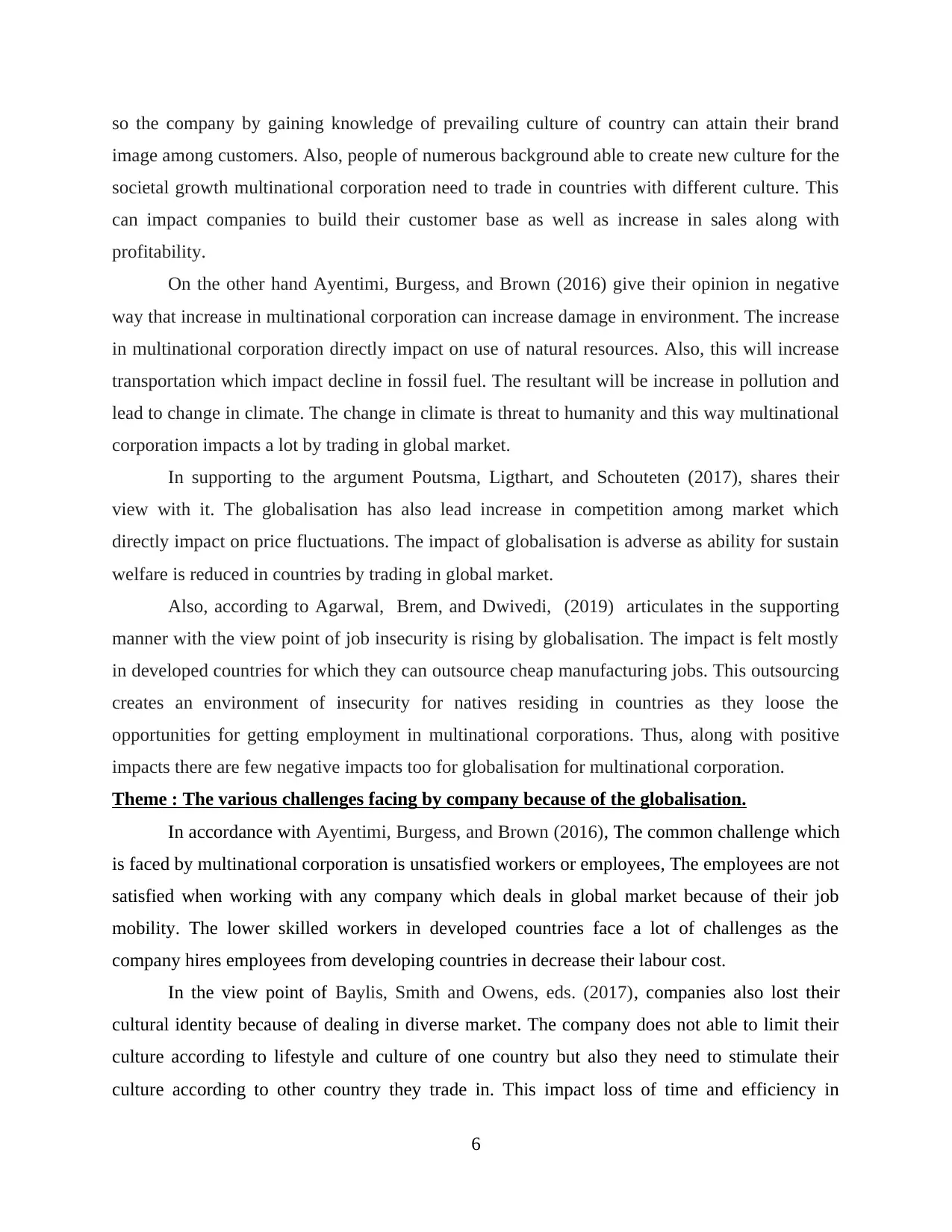
so the company by gaining knowledge of prevailing culture of country can attain their brand
image among customers. Also, people of numerous background able to create new culture for the
societal growth multinational corporation need to trade in countries with different culture. This
can impact companies to build their customer base as well as increase in sales along with
profitability.
On the other hand Ayentimi, Burgess, and Brown (2016) give their opinion in negative
way that increase in multinational corporation can increase damage in environment. The increase
in multinational corporation directly impact on use of natural resources. Also, this will increase
transportation which impact decline in fossil fuel. The resultant will be increase in pollution and
lead to change in climate. The change in climate is threat to humanity and this way multinational
corporation impacts a lot by trading in global market.
In supporting to the argument Poutsma, Ligthart, and Schouteten (2017), shares their
view with it. The globalisation has also lead increase in competition among market which
directly impact on price fluctuations. The impact of globalisation is adverse as ability for sustain
welfare is reduced in countries by trading in global market.
Also, according to Agarwal, Brem, and Dwivedi, (2019) articulates in the supporting
manner with the view point of job insecurity is rising by globalisation. The impact is felt mostly
in developed countries for which they can outsource cheap manufacturing jobs. This outsourcing
creates an environment of insecurity for natives residing in countries as they loose the
opportunities for getting employment in multinational corporations. Thus, along with positive
impacts there are few negative impacts too for globalisation for multinational corporation.
Theme : The various challenges facing by company because of the globalisation.
In accordance with Ayentimi, Burgess, and Brown (2016), The common challenge which
is faced by multinational corporation is unsatisfied workers or employees, The employees are not
satisfied when working with any company which deals in global market because of their job
mobility. The lower skilled workers in developed countries face a lot of challenges as the
company hires employees from developing countries in decrease their labour cost.
In the view point of Baylis, Smith and Owens, eds. (2017), companies also lost their
cultural identity because of dealing in diverse market. The company does not able to limit their
culture according to lifestyle and culture of one country but also they need to stimulate their
culture according to other country they trade in. This impact loss of time and efficiency in
6
image among customers. Also, people of numerous background able to create new culture for the
societal growth multinational corporation need to trade in countries with different culture. This
can impact companies to build their customer base as well as increase in sales along with
profitability.
On the other hand Ayentimi, Burgess, and Brown (2016) give their opinion in negative
way that increase in multinational corporation can increase damage in environment. The increase
in multinational corporation directly impact on use of natural resources. Also, this will increase
transportation which impact decline in fossil fuel. The resultant will be increase in pollution and
lead to change in climate. The change in climate is threat to humanity and this way multinational
corporation impacts a lot by trading in global market.
In supporting to the argument Poutsma, Ligthart, and Schouteten (2017), shares their
view with it. The globalisation has also lead increase in competition among market which
directly impact on price fluctuations. The impact of globalisation is adverse as ability for sustain
welfare is reduced in countries by trading in global market.
Also, according to Agarwal, Brem, and Dwivedi, (2019) articulates in the supporting
manner with the view point of job insecurity is rising by globalisation. The impact is felt mostly
in developed countries for which they can outsource cheap manufacturing jobs. This outsourcing
creates an environment of insecurity for natives residing in countries as they loose the
opportunities for getting employment in multinational corporations. Thus, along with positive
impacts there are few negative impacts too for globalisation for multinational corporation.
Theme : The various challenges facing by company because of the globalisation.
In accordance with Ayentimi, Burgess, and Brown (2016), The common challenge which
is faced by multinational corporation is unsatisfied workers or employees, The employees are not
satisfied when working with any company which deals in global market because of their job
mobility. The lower skilled workers in developed countries face a lot of challenges as the
company hires employees from developing countries in decrease their labour cost.
In the view point of Baylis, Smith and Owens, eds. (2017), companies also lost their
cultural identity because of dealing in diverse market. The company does not able to limit their
culture according to lifestyle and culture of one country but also they need to stimulate their
culture according to other country they trade in. This impact loss of time and efficiency in
6
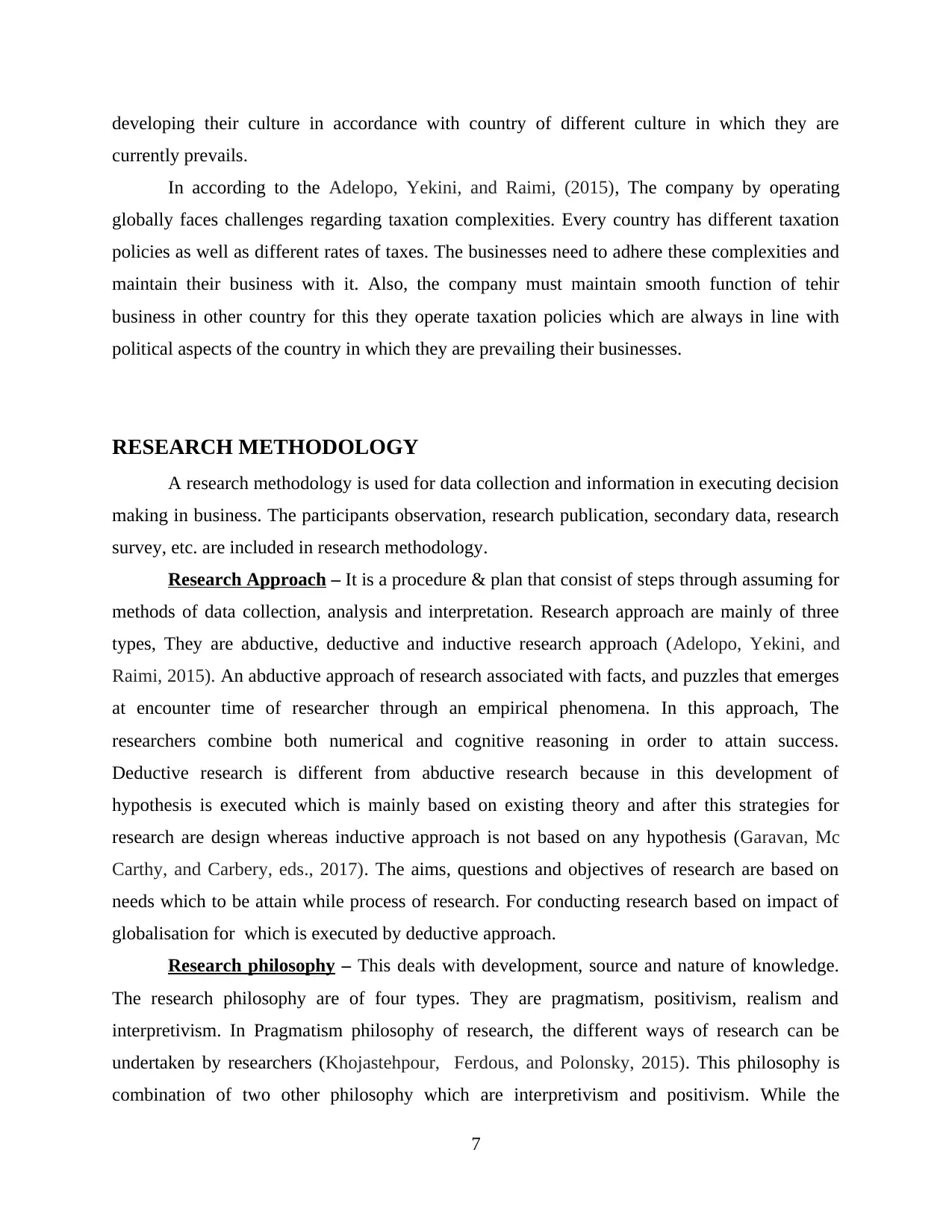
developing their culture in accordance with country of different culture in which they are
currently prevails.
In according to the Adelopo, Yekini, and Raimi, (2015), The company by operating
globally faces challenges regarding taxation complexities. Every country has different taxation
policies as well as different rates of taxes. The businesses need to adhere these complexities and
maintain their business with it. Also, the company must maintain smooth function of tehir
business in other country for this they operate taxation policies which are always in line with
political aspects of the country in which they are prevailing their businesses.
RESEARCH METHODOLOGY
A research methodology is used for data collection and information in executing decision
making in business. The participants observation, research publication, secondary data, research
survey, etc. are included in research methodology.
Research Approach – It is a procedure & plan that consist of steps through assuming for
methods of data collection, analysis and interpretation. Research approach are mainly of three
types, They are abductive, deductive and inductive research approach (Adelopo, Yekini, and
Raimi, 2015). An abductive approach of research associated with facts, and puzzles that emerges
at encounter time of researcher through an empirical phenomena. In this approach, The
researchers combine both numerical and cognitive reasoning in order to attain success.
Deductive research is different from abductive research because in this development of
hypothesis is executed which is mainly based on existing theory and after this strategies for
research are design whereas inductive approach is not based on any hypothesis (Garavan, Mc
Carthy, and Carbery, eds., 2017). The aims, questions and objectives of research are based on
needs which to be attain while process of research. For conducting research based on impact of
globalisation for which is executed by deductive approach.
Research philosophy – This deals with development, source and nature of knowledge.
The research philosophy are of four types. They are pragmatism, positivism, realism and
interpretivism. In Pragmatism philosophy of research, the different ways of research can be
undertaken by researchers (Khojastehpour, Ferdous, and Polonsky, 2015). This philosophy is
combination of two other philosophy which are interpretivism and positivism. While the
7
currently prevails.
In according to the Adelopo, Yekini, and Raimi, (2015), The company by operating
globally faces challenges regarding taxation complexities. Every country has different taxation
policies as well as different rates of taxes. The businesses need to adhere these complexities and
maintain their business with it. Also, the company must maintain smooth function of tehir
business in other country for this they operate taxation policies which are always in line with
political aspects of the country in which they are prevailing their businesses.
RESEARCH METHODOLOGY
A research methodology is used for data collection and information in executing decision
making in business. The participants observation, research publication, secondary data, research
survey, etc. are included in research methodology.
Research Approach – It is a procedure & plan that consist of steps through assuming for
methods of data collection, analysis and interpretation. Research approach are mainly of three
types, They are abductive, deductive and inductive research approach (Adelopo, Yekini, and
Raimi, 2015). An abductive approach of research associated with facts, and puzzles that emerges
at encounter time of researcher through an empirical phenomena. In this approach, The
researchers combine both numerical and cognitive reasoning in order to attain success.
Deductive research is different from abductive research because in this development of
hypothesis is executed which is mainly based on existing theory and after this strategies for
research are design whereas inductive approach is not based on any hypothesis (Garavan, Mc
Carthy, and Carbery, eds., 2017). The aims, questions and objectives of research are based on
needs which to be attain while process of research. For conducting research based on impact of
globalisation for which is executed by deductive approach.
Research philosophy – This deals with development, source and nature of knowledge.
The research philosophy are of four types. They are pragmatism, positivism, realism and
interpretivism. In Pragmatism philosophy of research, the different ways of research can be
undertaken by researchers (Khojastehpour, Ferdous, and Polonsky, 2015). This philosophy is
combination of two other philosophy which are interpretivism and positivism. While the
7
⊘ This is a preview!⊘
Do you want full access?
Subscribe today to unlock all pages.

Trusted by 1+ million students worldwide
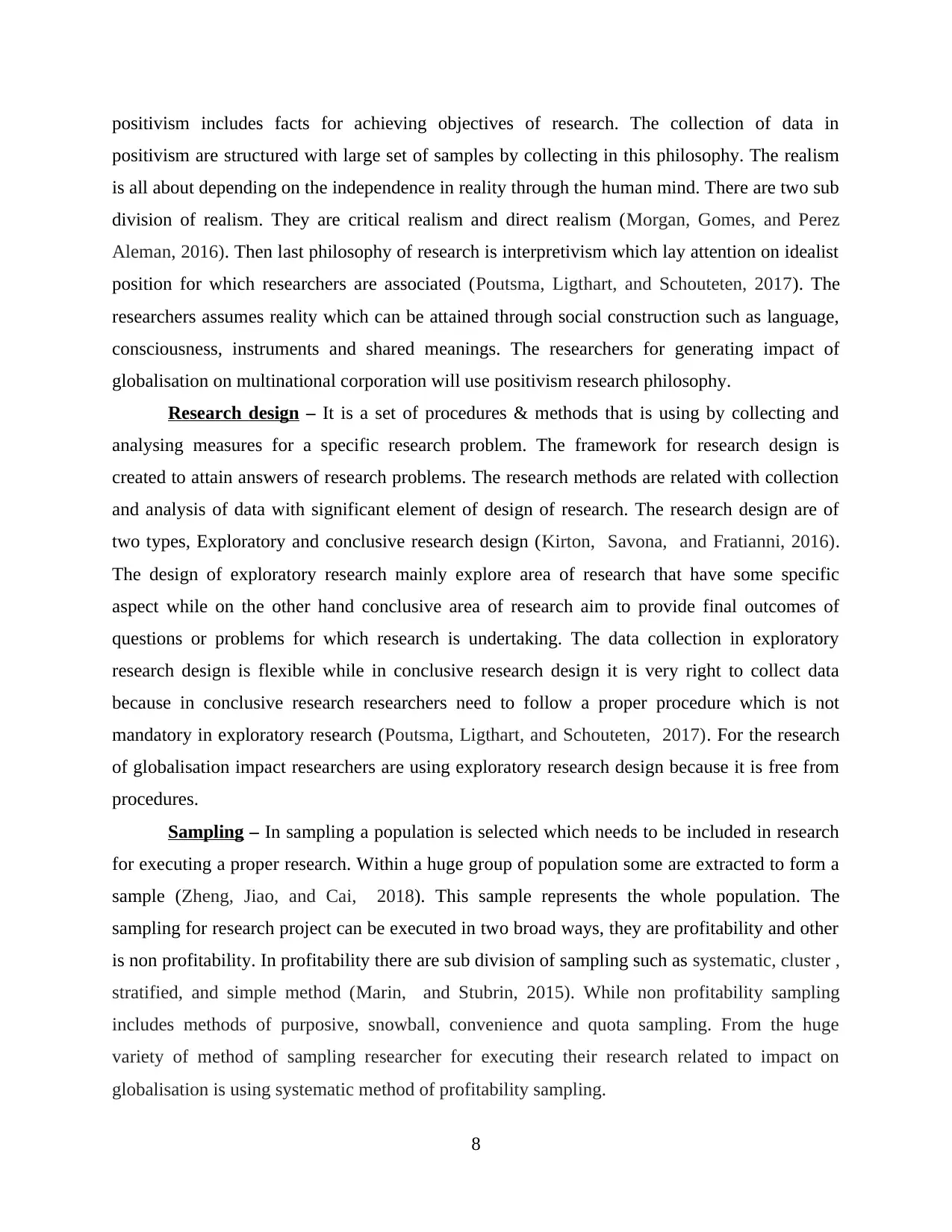
positivism includes facts for achieving objectives of research. The collection of data in
positivism are structured with large set of samples by collecting in this philosophy. The realism
is all about depending on the independence in reality through the human mind. There are two sub
division of realism. They are critical realism and direct realism (Morgan, Gomes, and Perez
Aleman, 2016). Then last philosophy of research is interpretivism which lay attention on idealist
position for which researchers are associated (Poutsma, Ligthart, and Schouteten, 2017). The
researchers assumes reality which can be attained through social construction such as language,
consciousness, instruments and shared meanings. The researchers for generating impact of
globalisation on multinational corporation will use positivism research philosophy.
Research design – It is a set of procedures & methods that is using by collecting and
analysing measures for a specific research problem. The framework for research design is
created to attain answers of research problems. The research methods are related with collection
and analysis of data with significant element of design of research. The research design are of
two types, Exploratory and conclusive research design (Kirton, Savona, and Fratianni, 2016).
The design of exploratory research mainly explore area of research that have some specific
aspect while on the other hand conclusive area of research aim to provide final outcomes of
questions or problems for which research is undertaking. The data collection in exploratory
research design is flexible while in conclusive research design it is very right to collect data
because in conclusive research researchers need to follow a proper procedure which is not
mandatory in exploratory research (Poutsma, Ligthart, and Schouteten, 2017). For the research
of globalisation impact researchers are using exploratory research design because it is free from
procedures.
Sampling – In sampling a population is selected which needs to be included in research
for executing a proper research. Within a huge group of population some are extracted to form a
sample (Zheng, Jiao, and Cai, 2018). This sample represents the whole population. The
sampling for research project can be executed in two broad ways, they are profitability and other
is non profitability. In profitability there are sub division of sampling such as systematic, cluster ,
stratified, and simple method (Marin, and Stubrin, 2015). While non profitability sampling
includes methods of purposive, snowball, convenience and quota sampling. From the huge
variety of method of sampling researcher for executing their research related to impact on
globalisation is using systematic method of profitability sampling.
8
positivism are structured with large set of samples by collecting in this philosophy. The realism
is all about depending on the independence in reality through the human mind. There are two sub
division of realism. They are critical realism and direct realism (Morgan, Gomes, and Perez
Aleman, 2016). Then last philosophy of research is interpretivism which lay attention on idealist
position for which researchers are associated (Poutsma, Ligthart, and Schouteten, 2017). The
researchers assumes reality which can be attained through social construction such as language,
consciousness, instruments and shared meanings. The researchers for generating impact of
globalisation on multinational corporation will use positivism research philosophy.
Research design – It is a set of procedures & methods that is using by collecting and
analysing measures for a specific research problem. The framework for research design is
created to attain answers of research problems. The research methods are related with collection
and analysis of data with significant element of design of research. The research design are of
two types, Exploratory and conclusive research design (Kirton, Savona, and Fratianni, 2016).
The design of exploratory research mainly explore area of research that have some specific
aspect while on the other hand conclusive area of research aim to provide final outcomes of
questions or problems for which research is undertaking. The data collection in exploratory
research design is flexible while in conclusive research design it is very right to collect data
because in conclusive research researchers need to follow a proper procedure which is not
mandatory in exploratory research (Poutsma, Ligthart, and Schouteten, 2017). For the research
of globalisation impact researchers are using exploratory research design because it is free from
procedures.
Sampling – In sampling a population is selected which needs to be included in research
for executing a proper research. Within a huge group of population some are extracted to form a
sample (Zheng, Jiao, and Cai, 2018). This sample represents the whole population. The
sampling for research project can be executed in two broad ways, they are profitability and other
is non profitability. In profitability there are sub division of sampling such as systematic, cluster ,
stratified, and simple method (Marin, and Stubrin, 2015). While non profitability sampling
includes methods of purposive, snowball, convenience and quota sampling. From the huge
variety of method of sampling researcher for executing their research related to impact on
globalisation is using systematic method of profitability sampling.
8
Paraphrase This Document
Need a fresh take? Get an instant paraphrase of this document with our AI Paraphraser
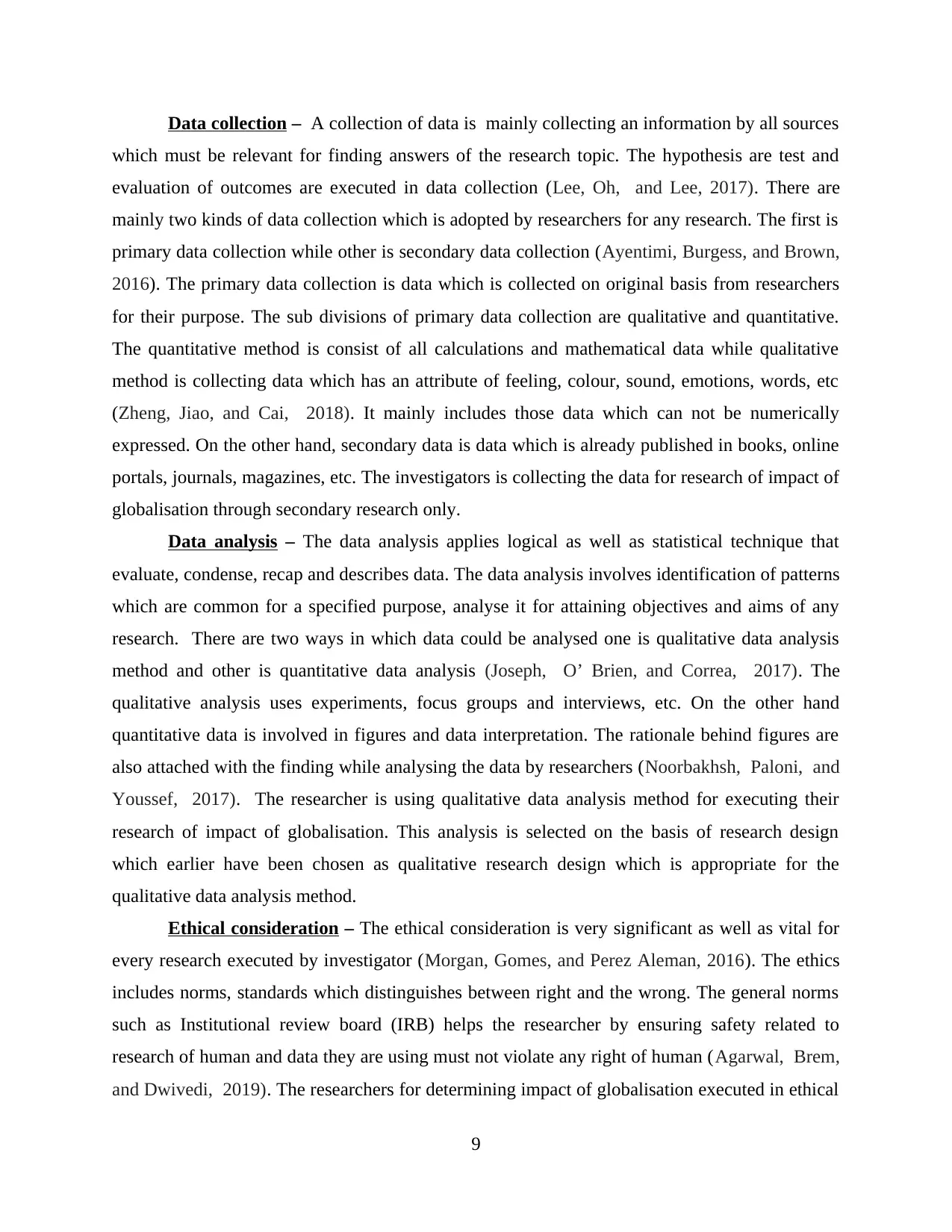
Data collection – A collection of data is mainly collecting an information by all sources
which must be relevant for finding answers of the research topic. The hypothesis are test and
evaluation of outcomes are executed in data collection (Lee, Oh, and Lee, 2017). There are
mainly two kinds of data collection which is adopted by researchers for any research. The first is
primary data collection while other is secondary data collection (Ayentimi, Burgess, and Brown,
2016). The primary data collection is data which is collected on original basis from researchers
for their purpose. The sub divisions of primary data collection are qualitative and quantitative.
The quantitative method is consist of all calculations and mathematical data while qualitative
method is collecting data which has an attribute of feeling, colour, sound, emotions, words, etc
(Zheng, Jiao, and Cai, 2018). It mainly includes those data which can not be numerically
expressed. On the other hand, secondary data is data which is already published in books, online
portals, journals, magazines, etc. The investigators is collecting the data for research of impact of
globalisation through secondary research only.
Data analysis – The data analysis applies logical as well as statistical technique that
evaluate, condense, recap and describes data. The data analysis involves identification of patterns
which are common for a specified purpose, analyse it for attaining objectives and aims of any
research. There are two ways in which data could be analysed one is qualitative data analysis
method and other is quantitative data analysis (Joseph, O’ Brien, and Correa, 2017). The
qualitative analysis uses experiments, focus groups and interviews, etc. On the other hand
quantitative data is involved in figures and data interpretation. The rationale behind figures are
also attached with the finding while analysing the data by researchers (Noorbakhsh, Paloni, and
Youssef, 2017). The researcher is using qualitative data analysis method for executing their
research of impact of globalisation. This analysis is selected on the basis of research design
which earlier have been chosen as qualitative research design which is appropriate for the
qualitative data analysis method.
Ethical consideration – The ethical consideration is very significant as well as vital for
every research executed by investigator (Morgan, Gomes, and Perez Aleman, 2016). The ethics
includes norms, standards which distinguishes between right and the wrong. The general norms
such as Institutional review board (IRB) helps the researcher by ensuring safety related to
research of human and data they are using must not violate any right of human (Agarwal, Brem,
and Dwivedi, 2019). The researchers for determining impact of globalisation executed in ethical
9
which must be relevant for finding answers of the research topic. The hypothesis are test and
evaluation of outcomes are executed in data collection (Lee, Oh, and Lee, 2017). There are
mainly two kinds of data collection which is adopted by researchers for any research. The first is
primary data collection while other is secondary data collection (Ayentimi, Burgess, and Brown,
2016). The primary data collection is data which is collected on original basis from researchers
for their purpose. The sub divisions of primary data collection are qualitative and quantitative.
The quantitative method is consist of all calculations and mathematical data while qualitative
method is collecting data which has an attribute of feeling, colour, sound, emotions, words, etc
(Zheng, Jiao, and Cai, 2018). It mainly includes those data which can not be numerically
expressed. On the other hand, secondary data is data which is already published in books, online
portals, journals, magazines, etc. The investigators is collecting the data for research of impact of
globalisation through secondary research only.
Data analysis – The data analysis applies logical as well as statistical technique that
evaluate, condense, recap and describes data. The data analysis involves identification of patterns
which are common for a specified purpose, analyse it for attaining objectives and aims of any
research. There are two ways in which data could be analysed one is qualitative data analysis
method and other is quantitative data analysis (Joseph, O’ Brien, and Correa, 2017). The
qualitative analysis uses experiments, focus groups and interviews, etc. On the other hand
quantitative data is involved in figures and data interpretation. The rationale behind figures are
also attached with the finding while analysing the data by researchers (Noorbakhsh, Paloni, and
Youssef, 2017). The researcher is using qualitative data analysis method for executing their
research of impact of globalisation. This analysis is selected on the basis of research design
which earlier have been chosen as qualitative research design which is appropriate for the
qualitative data analysis method.
Ethical consideration – The ethical consideration is very significant as well as vital for
every research executed by investigator (Morgan, Gomes, and Perez Aleman, 2016). The ethics
includes norms, standards which distinguishes between right and the wrong. The general norms
such as Institutional review board (IRB) helps the researcher by ensuring safety related to
research of human and data they are using must not violate any right of human (Agarwal, Brem,
and Dwivedi, 2019). The researchers for determining impact of globalisation executed in ethical
9
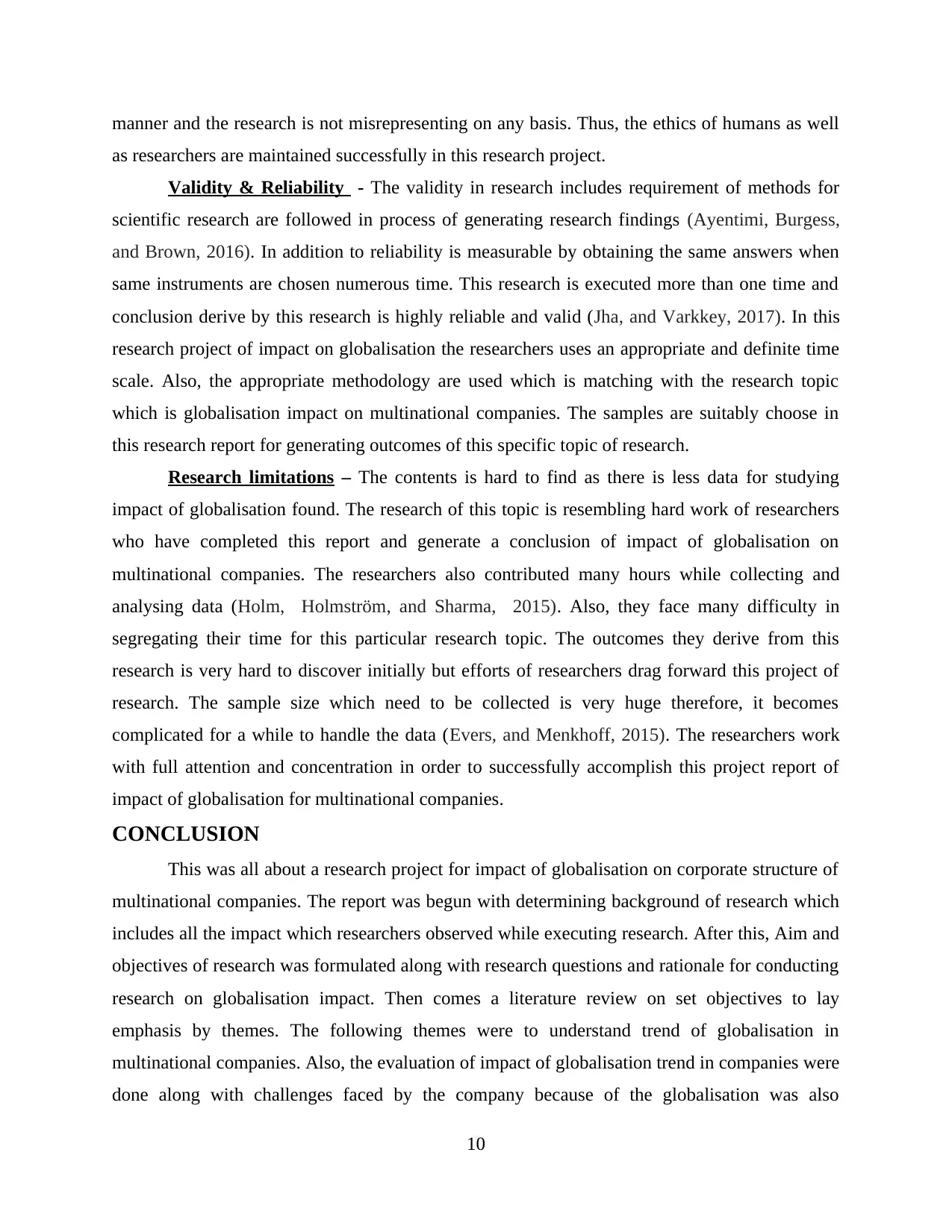
manner and the research is not misrepresenting on any basis. Thus, the ethics of humans as well
as researchers are maintained successfully in this research project.
Validity & Reliability - The validity in research includes requirement of methods for
scientific research are followed in process of generating research findings (Ayentimi, Burgess,
and Brown, 2016). In addition to reliability is measurable by obtaining the same answers when
same instruments are chosen numerous time. This research is executed more than one time and
conclusion derive by this research is highly reliable and valid (Jha, and Varkkey, 2017). In this
research project of impact on globalisation the researchers uses an appropriate and definite time
scale. Also, the appropriate methodology are used which is matching with the research topic
which is globalisation impact on multinational companies. The samples are suitably choose in
this research report for generating outcomes of this specific topic of research.
Research limitations – The contents is hard to find as there is less data for studying
impact of globalisation found. The research of this topic is resembling hard work of researchers
who have completed this report and generate a conclusion of impact of globalisation on
multinational companies. The researchers also contributed many hours while collecting and
analysing data (Holm, Holmström, and Sharma, 2015). Also, they face many difficulty in
segregating their time for this particular research topic. The outcomes they derive from this
research is very hard to discover initially but efforts of researchers drag forward this project of
research. The sample size which need to be collected is very huge therefore, it becomes
complicated for a while to handle the data (Evers, and Menkhoff, 2015). The researchers work
with full attention and concentration in order to successfully accomplish this project report of
impact of globalisation for multinational companies.
CONCLUSION
This was all about a research project for impact of globalisation on corporate structure of
multinational companies. The report was begun with determining background of research which
includes all the impact which researchers observed while executing research. After this, Aim and
objectives of research was formulated along with research questions and rationale for conducting
research on globalisation impact. Then comes a literature review on set objectives to lay
emphasis by themes. The following themes were to understand trend of globalisation in
multinational companies. Also, the evaluation of impact of globalisation trend in companies were
done along with challenges faced by the company because of the globalisation was also
10
as researchers are maintained successfully in this research project.
Validity & Reliability - The validity in research includes requirement of methods for
scientific research are followed in process of generating research findings (Ayentimi, Burgess,
and Brown, 2016). In addition to reliability is measurable by obtaining the same answers when
same instruments are chosen numerous time. This research is executed more than one time and
conclusion derive by this research is highly reliable and valid (Jha, and Varkkey, 2017). In this
research project of impact on globalisation the researchers uses an appropriate and definite time
scale. Also, the appropriate methodology are used which is matching with the research topic
which is globalisation impact on multinational companies. The samples are suitably choose in
this research report for generating outcomes of this specific topic of research.
Research limitations – The contents is hard to find as there is less data for studying
impact of globalisation found. The research of this topic is resembling hard work of researchers
who have completed this report and generate a conclusion of impact of globalisation on
multinational companies. The researchers also contributed many hours while collecting and
analysing data (Holm, Holmström, and Sharma, 2015). Also, they face many difficulty in
segregating their time for this particular research topic. The outcomes they derive from this
research is very hard to discover initially but efforts of researchers drag forward this project of
research. The sample size which need to be collected is very huge therefore, it becomes
complicated for a while to handle the data (Evers, and Menkhoff, 2015). The researchers work
with full attention and concentration in order to successfully accomplish this project report of
impact of globalisation for multinational companies.
CONCLUSION
This was all about a research project for impact of globalisation on corporate structure of
multinational companies. The report was begun with determining background of research which
includes all the impact which researchers observed while executing research. After this, Aim and
objectives of research was formulated along with research questions and rationale for conducting
research on globalisation impact. Then comes a literature review on set objectives to lay
emphasis by themes. The following themes were to understand trend of globalisation in
multinational companies. Also, the evaluation of impact of globalisation trend in companies were
done along with challenges faced by the company because of the globalisation was also
10
⊘ This is a preview!⊘
Do you want full access?
Subscribe today to unlock all pages.

Trusted by 1+ million students worldwide
1 out of 15
Related Documents
Your All-in-One AI-Powered Toolkit for Academic Success.
+13062052269
info@desklib.com
Available 24*7 on WhatsApp / Email
![[object Object]](/_next/static/media/star-bottom.7253800d.svg)
Unlock your academic potential
Copyright © 2020–2026 A2Z Services. All Rights Reserved. Developed and managed by ZUCOL.




